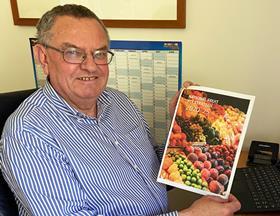
Implementing the National Fruit Fly Strategy 2020-25 via a sustainable funding model was the resounding conclusion from those who devoted their time to attend the National Fruit Fly Symposium held earlier this month.
Over 420 participants from a range of backgrounds including industry leaders, government representatives, researchers and growers took part in the symposium, where the discussions were around the theme ‘Building Future National Success’.
The three-day online event hosted by the National Fruit Fly Council (NFFC), Hort Innovation and Plant Health Australia was aimed at progressing discussion on critical fruit fly issues and identifying ways to build a cohesive national framework.
NFFC member and Nutrano Produce group technical manager, Steve Burdette, said the national strategy provides international and interstate trading partners confidence that Australia’s horticulture industries are working hard to manage fruit fly.
Burdette explained a critical element for successful control of fruit fly was to ensure alignment of on-farm production practices with effective policies to ensure market access and trade.
Cherry Growers Australia president Tom Eastlake identified international trade, a theme of discussion at the symposium, as critical. One of his key concerns was that the National Fruit Fly Strategy launched in November 2020 largely remained unfunded.
Department of Agriculture, Water and the Environment’s chief plant protection officer, Gabrielle Vivian-Smith, talked of the department’s commitment to ensuring borders were secure and there was adequate preparedness to be able to deal with exotic fruit fly detections.
“We need to not lose sight of real and present threats in the north; to ensure that we’re prepared to respond as a country in the event of an outbreak or detection onshore of oriental fruit flies,” she said.
Hort Innovation general manager research and development, Alison Anderson, said when it came to the implementation of the National Fruit Fly Strategy, there was a need for a coordinated national, state, regional and on-farm approach and clarity around who was responsible for what, when and how.
Anderson noted the importance of a strong research and development programme to support the needs of growers to ensure they remained viable and maintained access to markets.
NFFC manager, Christina Cook, identified trade as “the central driving force to managing fruit fly”.
“We need workable protocols and treatments to access markets. We need modern and effective on-farm management tools and access to information about those,” she said.
Farmers were good at managing fruit fly on-farm but needed support to manage the off-farm risks, and the things outside of their control, she said.
Cook listed some examples of off-farm challenges such as abandoned orchards, the availability of effective chemicals, building and maintaining area wide management in communities, and using SIT (sterile insect technology) as part of a strong national approach in Australia. Progressing these issues will be the focus for the Council in the coming months.
NFFC chairman, Lloyd Klumpp (pictured), was excited by the enthusiasm and maturity of discussions at the symposium. He believed the national strategy required coordination, collaboration, communication and commitment from all stakeholders to deliver the goal of contemporary, viable and cost-effective national approach to fruit fly management that Australia has set.
Klumpp said the Council was ready to take on the issues raised at the symposium by seeking those four 'Cs' from stakeholder participation in think tanks designed to deliver solutions and commitment to action.
Plant Health Australia’s chief executive, Sarah Corcoran, noted the NFFC is an important forum of governments, research providers and industries to provide leadership and advice on national fruit fly issues.
In reflecting on the success of the symposium in meeting these goals, Corcoran said, “we note the success that Council have achieved to date and look forward to building on those successes and being able to achieve the nationally responsive and integrated system that’s supported by all.



